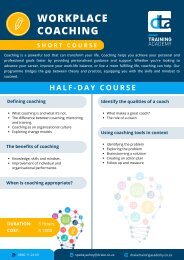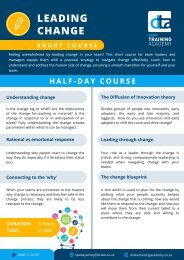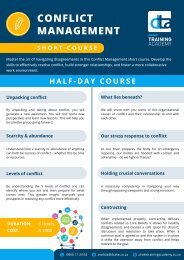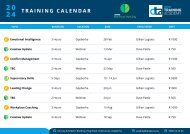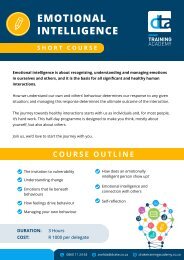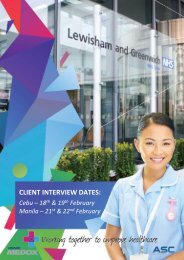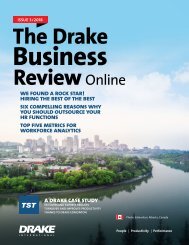Pre Departure Orientation - UK
Preparing for your move to the UK is an exciting thought! However, whether it be imminent or in the months ahead, there are plenty of things to familiarise with, plan for and remember.
Preparing for your move to the UK is an exciting thought! However, whether it be imminent or in the months ahead, there are plenty of things to familiarise with, plan for and remember.
Create successful ePaper yourself
Turn your PDF publications into a flip-book with our unique Google optimized e-Paper software.
<strong>UK</strong> Bound!
Congratulations on your new job!<br />
<strong>Pre</strong>paring for your move to the <strong>UK</strong> is an exciting thought!<br />
However, whether it be imminent or in the months ahead,<br />
there are plenty of things to familiarise with, plan for and remember.<br />
Please take the time to read through the following advice and tips<br />
which we hope will ensure your journey is as stress free as possible<br />
and will help ease you into your new life in the <strong>UK</strong>
Contents<br />
<strong>Pre</strong>paring for your departure .................................................................................................................... 4<br />
What to pack ........................................................................................................................................... 4<br />
<strong>Pre</strong>paring for your flight and entry to the <strong>UK</strong> ............................................................................................ 5<br />
Day of departure .............................................................................................................................................. 6<br />
Important documents to bring with you ................................................................................................... 7<br />
Arriving in the <strong>UK</strong> ..................................................................................................................................... 8<br />
Initial few days......................................................................................................................................... 9<br />
Adjusting to your new life! ......................................................................................................................10<br />
Currency ......................................................................................................................................................... 10<br />
Shopping ......................................................................................................................................................... 10<br />
Safety .............................................................................................................................................................. 10<br />
Transportation ................................................................................................................................................ 11<br />
Food & Cooking .............................................................................................................................................. 11<br />
Cleaning .......................................................................................................................................................... 12<br />
Security at home ............................................................................................................................................. 12<br />
Utilities ............................................................................................................................................................ 13<br />
Landline, Broadband & Mobile Phones .......................................................................................................... 13<br />
Internet ........................................................................................................................................................... 14<br />
TV .................................................................................................................................................................... 14<br />
Keeping safe during the pandemic ................................................................................................................. 14<br />
Banking & Finances......................................................................................................................................... 14<br />
National Insurance Number (NIN) .................................................................................................................. 15<br />
Pension ........................................................................................................................................................... 15<br />
Health & Wellbeing .................................................................................................................................15<br />
Wellbeing resources ....................................................................................................................................... 15<br />
Health - GP / Dentist / Covid and non-Covid related illness........................................................................... 16<br />
Foreign Embassies in the <strong>UK</strong> ....................................................................................................................17<br />
Post Deployment & Work-Related Issues .................................................................................................17<br />
Staffing levels, area allocations, local policies and procedures, independent working, OSCE prep & salary 17<br />
Homesickness, Quarantine/Lockdown pressures, Annual Leave, Travel ....................................................... 18<br />
Who/when to ask for help? ............................................................................................................................ 19<br />
Refunds from Employers (e.g., ELT, CBT, registration fees, etc.) ................................................................... 19<br />
Page 2
Use of Social Media ........................................................................................................................................ 20<br />
NMC Queries ..........................................................................................................................................20<br />
Immigration ............................................................................................................................................21<br />
Dependant/Family Visas ................................................................................................................................. 21<br />
Further Leave to Remain & Settlement in the <strong>UK</strong> .......................................................................................... 22<br />
Professional and Social Etiquette .............................................................................................................23<br />
General information about London & the <strong>UK</strong> ...........................................................................................25<br />
Finding your own accommodation in the longer term ..............................................................................27<br />
Places of Worship ...................................................................................................................................27<br />
Page 3
<strong>Pre</strong>paring for your departure<br />
Please take time to check the specific requirements and instructions for your airline and class of travel.<br />
These will be noted on your booking confirmation and/or ticket.<br />
It is currently mandatory for all travellers to the <strong>UK</strong> to have a PCR (Covid) test prior to departure from<br />
your home country. This test must be taken no more than 72 hours prior to your departure time and<br />
you must have a clear test result to travel. You will not be permitted to board the plane, nor gain entry<br />
to the <strong>UK</strong> without this.<br />
What to pack<br />
As you will know, the weather in the <strong>UK</strong> is likely to be very different to wherever you are coming from –<br />
and depending on what time of the year you are arriving, could be much colder than you have experienced<br />
in your home country. This is not to put you off – we have never had any of our candidates decide to leave,<br />
due to the weather – you will acclimatise (and even grow to love our seasons!)
oots and a rainproof coat or jacket. Temperatures average around 55°F to 65°F (12°C to 18°C). 10-14 daylight<br />
hours avg.<br />
Winter – December, January, February<br />
Temperatures are milder here in the winter than in many parts of the world, and rain is also common in<br />
this season. Snow is not unheard of, so be sure to pack warm clothes (as suggested above, layers are<br />
key! You may also like to bring hats, scarves and gloves.<br />
Temperatures average around 40°F to 50°F (4°C to 10°C). 8-9 daylight hours avg.<br />
Shoes<br />
During your free time, exploring your new home area, shopping, etc. you will need some comfortable<br />
shoes, preferably flat with a good sole.<br />
See your specific employer uniform policy for guidance on appropriate work shoes.<br />
There are several stores in the <strong>UK</strong> where you can purchase cheap clothing, e.g., Primark, New Look and<br />
even the major supermarkets have their own clothing brands which are reasonably priced.<br />
Windproof Travel Umbrella<br />
From light drizzles to heavy rains, the <strong>UK</strong> certainly necessitates an umbrella. Be sure to pack one that’s<br />
wind-resistant and folds down so that you can carry it easily when you’re not using it. Example: Repel<br />
Umbrella Windproof Double Vented Travel Umbrella with Teflon Coating (Black): Amazon.co.uk: Luggage<br />
<strong>UK</strong> Power Adaptor<br />
Britain uses a higher voltage than many other countries, which can easily fry your devices if you<br />
mistakenly plug them into an active power outlet. So, it is important to bring the correct adaptor for<br />
your electrical items.<br />
Example: Amazon.co.uk : HERO Universal Travel Adapter (2 USB Ports) ? Power Plug for US Europe<br />
France <strong>UK</strong> Ireland Thailand NZ Australia 100 Countries<br />
<strong>Pre</strong>paring for your flight and entry to the <strong>UK</strong><br />
Please read the information on the link below carefully, to familiarize yourself with the items you are<br />
legally permitted to bring into the <strong>UK</strong> on arrival.<br />
Bringing goods into the <strong>UK</strong> - GOV.<strong>UK</strong> (www.gov.uk)<br />
Failure to follow these guidelines could result in the confiscation of your items and a heavy fine – not a<br />
good start to your new life in the <strong>UK</strong>!<br />
Page 5
Day of departure<br />
It’s happened before. You arrive at the airport too early before your flight, and you’re stuck inside a<br />
cramped airport lounge for hours. On the flip side, you arrive too late, and you’re frantically running<br />
through airport terminals in a last-ditch effort to catch your flight. While weather and mechanical problems<br />
can cause unexpected delays on any given day at any airport, planning ahead for a variety of conditions<br />
and situations gives you the best chance at arriving for your flight at just the right time – with not too much<br />
time on your hands, but not too little to spare.<br />
You should typically arrive at the airport two hours before a domestic flight and three hours prior to an<br />
international flight. Many airport parking lots are far from the terminals, so you may need to allow extra<br />
time for a shuttle ride.<br />
Note: If you are travelling as part of an organized group, you will be given strict meet and greet instructions<br />
for the day of your travel by your overseas agency so please ensure you adhere to their guidance.<br />
Check-in times for luggage vary with each airline and airport. For instance, some airlines insist your bags<br />
must be checked at least one hour prior to takeoff. Airlines also have different policies regarding the time<br />
you must be at your gate prior to departure. Don’t be surprised if you get bumped from your flight for<br />
missing either of these deadlines.<br />
Each airline's website outlines its strict rules regarding the weight and dimensions of luggage. Carry-on<br />
bags must fit in an overhead bin or under your seat. Checked bags should have secure ID tags with<br />
accurate contact information in case they get lost in transit. Valuables, including cash, boarding pass,<br />
driver’s license, passport and medications, should be kept secure in your carry-on bag.<br />
You can complete a lot of travel “paperwork” ahead of time online. Most airlines let you check in online<br />
up to 24 hours in advance and download your boarding pass to your phone. You can also print your<br />
boarding pass at home or at the airport’s self-check-in kiosks. Bags to be checked in must be taken to the<br />
check in counter. Make sure the bags are tagged with your final destination, particularly if you’re making<br />
one or more connections. If you're traveling with just carry-on bags, you can skip the check-in counter and<br />
head straight to the security screening area.<br />
Airport Security<br />
Non-flammable liquids, gels and creams are allowed in carry-on bags as long as they adhere to the strict<br />
rules. See guidance below:<br />
Hand luggage restrictions at <strong>UK</strong> airports - GOV.<strong>UK</strong> (www.gov.uk)<br />
When passing through security checks you are required to put the following items into the trays<br />
provided and as directed by the security staff A sealed, plastic bag filled with liquids, gels and creams (as<br />
per guidance in link above)<br />
• All loose contents from your pockets<br />
• Shoes, belts and/or jackets that must be removed from your person<br />
• Large electronics, such as laptops and DVD players<br />
• Mobile phones<br />
Page 6
The final step in the security process involves walking through an advanced-imaging portal for a body<br />
screening. A triggered alarm may result in a pat-down, but you’ll be examined by a security officer of the<br />
same gender.<br />
Once through security, don’t forget to collect all of your belongings from the trays and put your valuables,<br />
including travel documents, safely away in your luggage again before leaving the security area.<br />
Security check queues can be very long, especially in peak periods, so best to clear security as soon as<br />
possible after check in.<br />
Don’t stray too far from your flight’s departure gate. Even if you successfully complete the check-in and<br />
security screening process, the airline can give your seat away if you’re not at the gate once boarding<br />
begins. The plane will also leave without you if you do not present for boarding by the appropriate<br />
deadline. Always listen out for the boarding announcements and keep checking the boarding information<br />
boards for the latest update. Changes can be made to stated boarding times so be aware.<br />
If you have to catch another flight at the next airport, remember to give yourself plenty of time to make<br />
your connection. Failure to do so may result in a missed flight and possible separation from your luggage.<br />
Make certain you prominently display your itinerary and contact information on the outside and the<br />
inside of your bag. If your ID tag is destroyed before or after your main and/or connecting flights, the<br />
airline workers will still need to trace you. <strong>Pre</strong>pare for the worst-case scenario and take a photo of your<br />
bag and particularly your most valuable items, so that if your bag is lost, you have a record of all your<br />
missing items, so the airline can properly compensate you for the loss of your possessions.<br />
If you have a connecting flight but your luggage is being checked through to your final destination, keep<br />
all of your valuable items, such as passports, travel documents, money, medications, in your carry-on bag.<br />
If your checked bag does get lost or misplaced between connecting flights, at least you won’t be without<br />
your essential items. Some travellers also pack a change of clothes in their hand luggage, in case of<br />
emergency or loss of checked in luggage.<br />
Make certain you remove old airline tags and stickers from previous trips which can confuse baggage<br />
handlers and may result in your luggage being sent to the wrong destination.<br />
Important documents to bring with you<br />
Apart from your passport and travel documents, you will need to bring the following original documents<br />
with you that must be presented either to your employer or the NMC (for nurses, at your ID<br />
appointment) or both:<br />
• Birth certificate<br />
• Marriage certificate (if applicable)<br />
• Professional degree certificate<br />
Page 7
• Professional registration certificate/licence for any country where you are currently registered (or<br />
declared as part of your NMC application)<br />
• Police certificate (for any country where you have lived and/or worked for 12 months or more in<br />
the last 10 years (since you were 18 years of age)<br />
• TB certificate<br />
• PCR certificate<br />
• Any other ID documents provided for our <strong>UK</strong> police clearance, e.g., bank statement, mobile/utility<br />
bills in your name, etc.<br />
• Any other documents you may have provided to the NMC in scanned copy as originals will be<br />
required at your ID appointment when you take your OSCE<br />
Arriving in the <strong>UK</strong><br />
One of our team will be at your airport of arrival to welcome you to the <strong>UK</strong>! The day before your departure,<br />
they will set up a WhatsApp group with you and any other travellers joining your cohort so that you can all<br />
keep in touch throughout your journey. You may be travelling alone, or with colleagues so either way you<br />
will definitely have someone to contact during your journey from home until you reach the <strong>UK</strong>.<br />
Once safely through immigration, please proceed to baggage collection and make sure you have all of your<br />
bags before exiting the baggage hall. If you are missing anything, report this immediately to the lost<br />
luggage desk within the baggage area.<br />
Once you have your bags, proceed through the “Nothing to Declare” exit (as you should have nothing to<br />
declare if you have read the guidance on what you are permitted to legally bring to the <strong>UK</strong>). Our Drake<br />
Medox representative will be waiting in the arrivals hall with a sign like this:<br />
Once you are all together, please do not wander off or leave your luggage unattended at any time. If you<br />
wish to use the washroom facilities before boarding the onward transport, please let the Drake<br />
representative know who will direct you to the nearest one. Please never leave your luggage unattended,<br />
so make sure you ask someone to watch over it if you go to the washroom.<br />
Our team member will distribute your welcome packs, give you some quick information/reminders and<br />
then call the transport to the meeting point. Once all luggage is loaded and you are aboard the transport,<br />
your taxi or coach will leave to take you to your designated meeting point at your employer site (usually<br />
Page 8
your initial accommodation). During COVID times, this will be where you will immediately quarantine for<br />
the mandated period.<br />
See your Bonding Agreement and Job Offer details for full information about the accommodation<br />
provisions, i.e., mandated length of tenancy, type of housing provided, onsite or privately rented, cost of<br />
monthly rental, whether any period is paid for by your employer, any food provisions made in the initial<br />
period, what’s included within the accommodation, etc.<br />
You will be met at the drop off point by a member of the hospital team who will welcome you and see you<br />
safely into your new home.<br />
Initial few days<br />
Whilst the pandemic is ongoing, you will be isolating in the accommodation, with the rest of your cohort,<br />
for 10-14 days and food will be arranged for you at least for the first few days and up to the full duration<br />
of the isolation period, depending on your specific employer’s arrangements. You will be advised of this<br />
in advance.<br />
You are not permitted to leave the accommodation under any circumstances during the mandated<br />
isolation period and failure to follow this instruction could result in disciplinary action from your employer<br />
and even worse, a £10k fine from the police if you are found to be breaking the quarantine rules of the<br />
<strong>UK</strong>.<br />
Your OSCE training will start in earnest at the start of your first full week in the <strong>UK</strong>, although different<br />
employers have different arrangements for length of training and how it is delivered. Obviously during<br />
quarantine, you will be receiving all training online which you can access via your phones, laptops, tablets,<br />
etc. If needs be, many employers will provide a laptop to share between cohorts so that everyone has<br />
access.<br />
Some, if not all corporate induction may also be provided during the initial quarantine period, but in some<br />
cases, may not happen until after you are out of isolation and able to go into the hospital. Your practical<br />
training for OSCE cannot start until after your quarantine period as you will need to be in a face to face,<br />
classroom/mock OSCE set up for this.<br />
You will be expected to focus all of your energies and attention on OSCE training during this time so please<br />
make sure you attend all prescribed training sessions and make every effort to spend other times<br />
undertaking self-learning with the materials provided by your employer and/or the university website<br />
which you will be given access to.<br />
Page 9
Adjusting to your new life!<br />
Currency<br />
• <strong>UK</strong> currency is the Pound Sterling (£/GBP)<br />
• There are 100 pence (‘p’) to the pound (£)<br />
• Notes come in denominations of £5, £10, £20 and £50<br />
• Coins come in denominations of 1p, 2p, 5p, 10p, 20p, 50p, £1 and £2<br />
British people usually refer to pence as “p”, as in 50p (50 pee). More colloquially, £1 pound is sometimes<br />
called a "quid", a £5 note is a "fiver", 5 pounds or 5 quid, and a £10 note a "tenner".<br />
Shopping<br />
Most of the bigger supermarkets and superstores are open either 24 hourly (Monday to Saturday usually)<br />
or from early morning to late at night. You can check all opening times on line. Most of the big stores also<br />
offer home delivery which you book via their website – although notice for delivery slots do vary from 24<br />
hours’ notice to 2 weeks depending on how busy they are. When we are not in lockdown, there are several<br />
other smaller food shops you can visit, including ones that will sell international foods but supermarkets<br />
have a good stock of these too nowadays.<br />
Safety<br />
The <strong>UK</strong> is a very safe country to travel to. It has a low violent crime rate and lower petty theft rate than<br />
most of the other main European cities. However, it is NOT crime free. Just be conscious of your<br />
surroundings and be extra vigilant in crowds where pickpockets are more prevalent.<br />
NB: Please do not carry around your important ID documents, such as passport and BRP, unless you need<br />
to for a specific reason, e.g., appointment with Embassy/POLO for renewal or validation of documents,<br />
travel outside of <strong>UK</strong>, etc. You are advised to leave these documents somewhere secure at home. If you<br />
travel outside of the <strong>UK</strong> for a holiday, for example, again there is no need to keep these on your person<br />
once you have arrived in the country. Leave them ideally in a hotel safe or in another secure place in your<br />
accommodation. We have seen many nurses lose their passports or BRPs when overseas and having to<br />
travel back to the Philippines to secure a new passport before they can re-enter the <strong>UK</strong> – this cannot be<br />
arranged from within the country where you lost the ID document.<br />
One factor that could be considered a risk is traffic. In the <strong>UK</strong> people drive on the left-hand side of the<br />
road. Tourists often forget this when crossing and are therefore more prone to road accidents. Please be<br />
sure to look BOTH ways before crossing a road and follow all traffic and pedestrian cross signs and<br />
directions.<br />
The Police in the <strong>UK</strong> are here to protect everyone. You can always feel safe approaching a police officer if<br />
you need any assistance or even if you are just lost and wish to ask directions or advice.<br />
Page 10
Transportation<br />
There are a number of ways to pay for transport within London, including buying an individual ticket, using<br />
a contactless payment card, using an Oyster card, or purchasing a weekly/monthly/annual travelcard. The<br />
main source of public transport in London is the Underground (or the Tube as it is known to Londoners).<br />
Outside of the centre of London, Tube stations are further apart, so buses help fill the gaps. Also, the<br />
budget-conscious will find that the bus offers a cheaper alternative, even if it is a slower journey.<br />
If you are based outside of London, then there is also a network of overground railway stations throughout<br />
the whole of the <strong>UK</strong> (and in London) as well as buses, coaches and trams. It is easy to get around!<br />
Some useful links:<br />
Keeping London moving - Transport for London (tfl.gov.uk)<br />
National Rail Enquiries - Official source for <strong>UK</strong> train times and timetables<br />
Coach Travel & Airport Transfers | National Express<br />
Santander Cycles - Transport for London (tfl.gov.uk)<br />
If you have a full, valid driving licence from your home country, you can drive in Great Britain for 12<br />
months from when you became resident in the <strong>UK</strong>.<br />
After 12 months you’ll need to apply for a provisional licence and pass the theory and practical driving<br />
tests to continue driving in Great Britain.<br />
Driving in Great Britain on a non-GB licence - GOV.<strong>UK</strong> (www.gov.uk)<br />
If you wish to hire a car within the first 12 months, you will need to meet the specific requirements of<br />
whichever car rental company you use – their criteria may differ slightly. Here are links to a few of the<br />
bigger car rental companies in the <strong>UK</strong>:<br />
Driver's License Requirements - <strong>UK</strong> and Ireland | Enterprise Rent-A-Car<br />
Car Hire & Van Hire - <strong>UK</strong> and Worldwide | Europcar <strong>UK</strong><br />
Cheap Car Hire & Van Rental - Budget<br />
Parking<br />
If you do ever drive in London or across the <strong>UK</strong>, you need to be aware of general parking restrictions and<br />
tolls/charges to pay in certain areas (particularly London). Parking cars in private/public car parks and on<br />
parking meters on the street is usually charged by the hour and can be paid by card at the machine, or<br />
online via several apps that you can download.<br />
There are some really useful general tips on parking do’s and don’ts on this link – good to read if you don’t<br />
want to pick up any fines (which can be heavy!) Parking restrictions - everything you need to know | The<br />
AA<br />
Food & Cooking<br />
It is safe to drink water from the cold taps in the kitchens in the <strong>UK</strong> and to brush your teeth with water<br />
from the bathroom sink.<br />
Page 11
Obviously, some food will be different in the <strong>UK</strong> to what you are used to at home – but that should not be<br />
seen as a bad thing necessarily! With the <strong>UK</strong> being home to such a diverse population, there aren’t many<br />
world foods that can’t be accessed somewhere or somehow in the <strong>UK</strong> nowadays. However, be<br />
adventurous! Try new things too, you never know you might find some tasty new favourites!<br />
If cooking in shared accommodation, when you may be with a mix of nurses from various countries, be<br />
respectful of cultural differences and be mindful of strong smells that may not be to everyone’s liking! It’s<br />
easy just to open a window or use an extractor fan if there is one to ensure that your living area is not<br />
overpowered<br />
by certain aromas. Please also make sure you clean the kitchen and equipment so that others are able to<br />
use the same facilities after you. Food should not be washed down sinks or toilets and should be disposed<br />
of in the proper bins provided. Rice and pasta particularly cause blockages and can result in expensive<br />
emergency plumber call outs.<br />
Cleaning<br />
Please ensure you maintain a good standard of cleanliness of any accommodation you move into, whether<br />
that be Trust accommodation or private rentals. Any landlord or managing agent will expect you to leave<br />
the property as you found it, i.e., clean and tidy and to show that you have respected the property during<br />
your tenancy.<br />
When using the shower or bath, be careful not to get the floors too wet. Many of you will come from hot<br />
countries where wet floors dry quickly and easily. This is not the case in the <strong>UK</strong> and water not wiped up<br />
can cause damage to floors and in some cases, cause leaks into rooms/accommodation below.<br />
Clean the toilet, sink and bath or shower regularly, especially when there are often shared facilities so used<br />
by a number of people every day. Make sure hair (especially long hair) does not clog up the drain holes<br />
and cause blockages.<br />
In the <strong>UK</strong> it is fine to flush toilet paper down the toilet – you should not put paper in a bin. With sanitary<br />
products however (tampons or sanitary towels), these should be wrapped or bagged and disposed of in<br />
the bin rather than flushing down the toilet.<br />
Security at home<br />
If in onsite accommodation, all outer doors are usually kept shut/locked 24/7 and you will have your own<br />
key to the outer/inner communal doors and a separate one to your own private room. In shared, private<br />
accommodation, you will have a key to your front door and sometimes a back door (for houses) so please<br />
make sure you are security conscious and lock these doors at night and if you go out and leave the house<br />
at any time.<br />
Please also makes sure windows are closed when you leave the house to prevent anyone attempting to<br />
unlawfully enter the premises.<br />
All accommodation will be furnished with the essentials, e.g., kitchen facilities, fitted bathroom(s), bed and<br />
wardrobe/cupboard/drawers and bed linen. Sometimes towels are provided but it is advisable to pack at<br />
Page 12
least one towel to bring with you. You can obviously buy more of these items once you are in the <strong>UK</strong>. Most<br />
kitchens will be equipped with a microwave, some will have a rice cooker, and all will have the basics such<br />
as kettle, saucepans, cutlery, plates, bowls and cups, and so on. This is not standard when renting<br />
properties, but your employers will have made these additional provisions for you. There is an array of<br />
shops in the <strong>UK</strong> that stock household items very cheaply.<br />
Utilities<br />
When moving to the <strong>UK</strong>, understanding which utilities you need and how to get them is important.<br />
Energy & Water Supply<br />
If you are renting a property, it is likely that your landlord is already supplying the property with the basic<br />
utilities of gas, electricity and water. You may have a choice of gas and electricity supplier depending on<br />
your tenancy agreement and there are a number of online services that will help you select the best option<br />
for you. One of the most popular is called USwitch.<br />
Your gas and electricity are based on consumption, and in some cases estimated consumption.<br />
Somewhere in your property you will have gas, electricity and water meters which provide the energy<br />
company provider with<br />
details of how much gas/electricity you have used. Your bill will then be based on this. You should be able<br />
to choose whether you pay monthly or quarterly.<br />
It is a similar situation with your water supply, although you may or may not have a water meter, and you<br />
will not have a choice over the supplier of water to your property.<br />
Landline, Broadband & Mobile Phones<br />
Most properties are normally connected to a phone line. However, they may not be active. You can also<br />
switch telephone provider if your tenancy agreement allows. You are likely to be required to set up your<br />
own account with a telephone supplier to ensure you are responsible for any calls you make. A landline<br />
is also required for a broadband connection.<br />
Virtually everybody in the <strong>UK</strong> has a mobile phone, and there are a number of suppliers including the major<br />
operators Vodafone, EE and O2. However, you can also join a whole range of networks and all information<br />
can be found online or in high street shops.<br />
You will have a choice of contract –either choose a pay as you go option or pay monthly. If you already<br />
have a mobile phone, it is suggested that you get a SIM only deal as this significantly reduces any monthly<br />
expenditure. However, in the long run, it is often cheaper to enter into a 12-24 month contract to get the<br />
most for your money in terms of data and call allowances.<br />
To get a pay monthly agreement, you will need to have a home address as a minimum and may need to<br />
be credit checked. For most expats new to the <strong>UK</strong>, you may have limited options for monthly accounts<br />
until you have built up some credit history in the <strong>UK</strong>.<br />
Page 13
Internet<br />
The internet has fast become a necessity in life and for people moving to the <strong>UK</strong>, probably one of the more<br />
important utilities as it ensures that you can keep in touch with relatives as well as do research in the<br />
comfort of your own home.<br />
There are a wide range of internet service providers in the <strong>UK</strong>, some (such as BT and Virgin Media) offering<br />
dedicated fibre optic connections. There are also companies such as Sky and PlusNet who offer nondedicated<br />
broadband connections via your phone line.<br />
TV<br />
In the <strong>UK</strong>, it is essential that every property that has access to a television has a TV license. The TV License<br />
is an annual license which permits a homeowner or tenant to watch television. If you are renting and have<br />
separate TVs, each tenant who has a tenancy agreement will be required to have their own TV license.<br />
TV licenses cost £157.50 per year, although can be paid on a quarterly, monthly or even weekly basis.<br />
They are licensed to an individual which means that if you move home, you take the license with you, but<br />
you have to notify the TV Licensing company of your change of address.<br />
Failure to have a TV license can result in a fine of up to £1,000. If you either don’t have a TV at all or don’t<br />
watch any live TV on any device, then you can be exempted from having a TV licence but you need to<br />
inform ‘TV Licensing’<br />
Telling us you don't need a TV Licence - TV Licensing <br />
Keeping safe during the pandemic<br />
In the <strong>UK</strong> currently, it is mandatory to wear a face covering when going on any Public Transport, when<br />
entering shops and wherever else you are requested to. Below is the link to the Government Guidelines<br />
around staying safe while outside in the <strong>UK</strong><br />
https://www.gov.uk/government/publications/staying-safe-outside-your-home/staying-safeoutsideyourhome?gclid=EAIaIQobChMIh7fTtIGT6wIVk8DACh1TbA0OEAAYAiAAEgLFyPD_BwE<br />
Banking & Finances<br />
Your employers advise on how to go about setting up a bank account once you are in the <strong>UK</strong>. Some will<br />
even make arrangements for you to open an account with one of their local major banks once you are out<br />
of quarantine.<br />
Having a <strong>UK</strong> bank account is essential for receiving your salary, keeping cash safe and for setting up<br />
automatic payments for items such as a mobile phone (cell) bills and monthly payments for your utilities.<br />
Once you have a <strong>UK</strong> mobile number, you can open an on-line bank account with “Monzo” which will enable<br />
you to do online shopping immediately during your quarantine period (if you wish)<br />
https://monzo.com/blog/2019/08/28/how-to-open-a-monzo-account<br />
Page 14
National Insurance Number (NIN)<br />
A National Insurance Number is assigned to each <strong>UK</strong> resident by the Tax Office and is used to calculate<br />
and record taxes owed and paid. It is mandatory for all those working in the <strong>UK</strong> to have a NI number and<br />
therefore and this information is included on your BRP which you will collect from the post office as soon<br />
as you are out of quarantine. You must also provide a copy of your BRP once collected, to the HR/payroll<br />
department for your record.<br />
Pension<br />
All NHS employees are automatically entered into the NHS Pension Scheme, it is one of the most<br />
competitive pension schemes available in the <strong>UK</strong>. However, you can opt-out by following the instructions<br />
on the NHS Pensions Website (link below). You can opt-in and opt-out as many times as you like while you<br />
work of the NHS.<br />
Please note: A pension is a really valuable investment to make. For people in their 20’s and 30’s, paying<br />
into something now that won’t be of use to you until much later in life may not seem very important right<br />
now. Initially, it may be viewed as an unnecessary expenditure out of your hard-earned monthly salary.<br />
However, we would strongly recommend you think carefully or even take some professional advice before<br />
deciding to opt out of the pension scheme offered by your employer. In particular, the NHS pension<br />
scheme is very generous and will really set you up in later life if you were to remain within the <strong>UK</strong> NHS.<br />
Please also be advised that opting out of the pension scheme may also mean you are automatically waiving<br />
your right to any death in service benefit and whilst this would be a rare occurrence, anything in life is<br />
possible and we should protect ourselves and our loved ones in this event.<br />
Health & Wellbeing<br />
Wellbeing resources<br />
The NMC website provides a number of useful links to help support nurses with wellbeing:<br />
The people on our register are doing extraordinary things in the face of an extraordinary challenge, and<br />
some might need more support than ever before. Getting the help you need, will help you to care for<br />
others.<br />
Several organisations have developed resources to support the mental wellbeing of those working in<br />
health or social care – we have listed some of these below.<br />
The list isn’t exhaustive. Your employer, university or union may have other resources available for you to<br />
use.<br />
• NHS Employers | Support available for NHS staff<br />
• Our NHS people | National mental wellbeing support (also open to those in social care)<br />
• Royal College of Nursing | Coronavirus and your mental wellbeing<br />
• Mind | Coping as a key worker<br />
• Mental Health at Work | Our Frontline<br />
Page 15
• Royal College of Emergency Medicine | RCEM wellbeing app (for those working in emergency or<br />
critical settings)<br />
• British Psychological Society | Guide for managers and leaders of healthcare services<br />
Health - GP / Dentist / Covid and non-Covid related illness<br />
When you arrive in the <strong>UK</strong>, you will be advised to register with a local GP practice.<br />
NHS choices for GP Practices: https://www.nhsgp.net/<br />
Quarantines and lockdowns have made this process more challenging for some, but it is important that<br />
you take on the responsibility to ensure that you register with a GP as they are your primary resource for<br />
medical care if ever you need to see a Doctor. If you are unwell and have been unable to register with a<br />
GP, you should dial 111 for advice and help.<br />
999 is reserved for life threatening emergencies.<br />
It is not always easy to register with a local NHS Dentist and there are private options available. Again, the<br />
111 service will be able to direct for where to go/call for emergencies and out of hours services. NHS<br />
Dentist treatment is not free of charge but usually much cheaper than private dentistry.<br />
If you have symptoms that may be Covid related, you must follow the guidelines, stay home, isolate and<br />
seek help if you are very unwell. Again, a call to 111 is advised. You will likely have been given advice at<br />
your place of work on what to do. Covid infections are rising currently in the <strong>UK</strong> and many nurses and<br />
healthcare professionals have already been affected. Thankfully, many have few or no symptoms and<br />
many more recover in a short space of time.<br />
In cold weather, it is tempting to keep windows closed all the time to keep heat in. However, it is important<br />
to ventilate rooms and living areas during the day for a period of time when you are at home. The latest<br />
Page 16
guidance for preventing cross infection is ‘Hands, Face, Space, Ventilate’. Remember to always wash your<br />
hands thoroughly, wear a face covering as required, maintain 2 metres distance from others when outside<br />
your home, and ventilate your home by opening windows when safe to allow fresh air to circulate.<br />
Note: Remember that the Immigration Health Surcharge has now been abolished for healthcare workers<br />
coming to the <strong>UK</strong> to join the NHS or private health sector. This means that all healthcare, apart from<br />
prescription charges, are free of charge. <strong>Pre</strong>scriptions are payable at £9.15 per medication. Further details<br />
can be found on this link NHS prescription charges - NHS (www.nhs.uk)<br />
Foreign Embassies in the <strong>UK</strong><br />
United Kingdom - Embassies & Consulates (embassypages.com)<br />
Depending on which source country you are coming from, your Embassy in London may offer certain<br />
services (some mandatory) for newly deployed workers.<br />
Please take time to check on the relevant website to familiarise yourself with any mandatory or option<br />
services you may be.<br />
Note: If you are from the Philippines you are requested to attend one of the regular Post Arrival<br />
<strong>Orientation</strong> Seminars that are run by the Labor Attache and the POLO team (Philippine Overseas Labor<br />
Office) and information of the schedule will be advised to you upon deployment. Not only is this a chance<br />
to listen to all of the useful and interesting advice that POLO have to give to OFWs but it is also a chance<br />
to have your <strong>UK</strong> employment contract validated and learn about all of the other services on offer from<br />
POLO to Filipino OFWs.<br />
Post Deployment & Work-Related Issues<br />
Staffing levels, area allocations, local policies and procedures, independent<br />
working, OSCE prep & salary<br />
You will be aware that each employer who recruits nurses and other healthcare professionals from<br />
overseas is doing so because they cannot recruit sufficient numbers of staff in the <strong>UK</strong>. In order to do so,<br />
they must provide evidence of their recruitment challenges, register as an A Rated Sponsor with <strong>UK</strong>VI and<br />
follow all the relevant rules so that they can sponsor you for a work visa. The Trusts/employers are also<br />
making a significant financial investment in each person they recruit and providing a lot of resources that<br />
they don’t do for candidates recruited locally/nationally.<br />
In order to further assist nurses from overseas and to ensure you achieve your NMC registration, they<br />
provide training to help in your preparation for your OSCE exam. They are not obliged to do this. The NMC<br />
expects that every nurse applying to join the <strong>UK</strong> register is accessing the nursing blueprints on their<br />
website and the portals of the test centres in order to prepare for the Test of Competence (CBT and OSCE).<br />
Page 17
Every employer that Drake Medox works with provides targeted OSCE training to assist you to prepare for<br />
this exam and to date, with very high success rates.<br />
It is also your individual responsibility to do all you can independently to prepare for the exams and to ask<br />
for assistance if needed. If you have not been given a work email address or access to local policies and<br />
procedures, you must ask your line manager so that you may familiarise with these. Not all learning is in<br />
the classroom and much of the reading and learning nurses do in the <strong>UK</strong> is self-directed.<br />
All nurses must be flexible in terms of allocations to clinical areas and/or temporary moves to other areas<br />
as required, in order to provide the care needed by your patients. It is an especially stressful time in the<br />
hospitals right now, and there are enormous pressures due to the pandemic and the current crisis in the<br />
<strong>UK</strong>. Not only is there an increase in very sick patients, but staffing levels are affected by staff illness/need<br />
to isolate, etc.<br />
We appreciate that these are very challenging times for all, and it is important that you let your manager<br />
know if you are stressed or feel you need help in coping. Your patients and their families and loved ones<br />
are very appreciative of all that you are doing and are very much reliant on the care they receive from each<br />
of you. Everyone has bad days, so try to stay fit and well and positive. We are delighted that healthcare<br />
professionals are among top priority now for the vaccine rollout and we hope that with time and<br />
commitment, everything will improve.<br />
In terms of Salary, the pay for Nurses and NHS workers is standardised in the <strong>UK</strong> and whilst the vast<br />
majority of people in the <strong>UK</strong> support pay increases for Nurses and Healthcare Professionals, this is<br />
something that needs to be driven at Government level. Please contact your local union representatives<br />
to find out what they are doing on your behalf to effect change. This is an ongoing challenge however as<br />
the NHS is the biggest employer in the <strong>UK</strong> and with patients not paying to access NHS care and treatment,<br />
funding for the NHS is limited.<br />
Homesickness, Quarantine/Lockdown pressures, Annual Leave, Travel<br />
We totally understand this, and it is important to stay in touch with people and to talk about your feelings<br />
with friends, colleagues, and family. We are all human and are all affected in some way by these things.<br />
Homesickness is difficult and particularly in the early weeks and months of leaving home. Some people<br />
still feel pangs of homesickness for long periods, but it usually becomes less frequent as we adapt to a<br />
new living and working environment. Quarantine can be challenging and stressful, it is not the same<br />
experience as for those who arrived in the <strong>UK</strong> pre-pandemic and lockdowns, when at least time away from<br />
work could be filled with other distractions, exploring the area, meeting up with friends, etc. You will know<br />
more than others (as you are working in hospitals), just how important it is for all of us to follow the<br />
quarantine and lockdown rules. The NHS is asking everyone to obey the rules and you must be shining<br />
examples of this. It will not be forever.<br />
There is a brighter future ahead for all of us and we must stay safe - and keep others safe. We all look<br />
forward to a time where we can mix freely with our friends again, when we can travel safely and take<br />
holidays, visit family, etc. That time will come, and when it does, no doubt there will be thousands of<br />
healthcare workers in the <strong>UK</strong> wanting to take extended leave to visit family overseas. Please do be<br />
conscious of this also. Most employers will do what they can to accommodate these leave requests, but<br />
they certainly cannot allow large numbers of staff to take weeks off at the same time, e.g., Christmas.<br />
Page 18
Speak with your managers always before making bookings or confirming any travel plans, and when it is<br />
safe to travel again, we hope everyone will be accommodated in turn.<br />
Who/when to ask for help?<br />
Problems related to your employment, whether it be about your role, a dispute within your team or with<br />
a colleague, a need for particular support with something, the first port of call should be your line manager<br />
and/or HR.<br />
Any queries or issues with salary, pension, costs to repay under the terms of your job offer, etc. must be<br />
addressed to the payroll department in the first instance and if necessary, your line manager. If you are<br />
unable to resolve the issue, you may contact the team at Drake Medox for assistance.<br />
If you need to renew your passport, validate your contract (if you are a healthcare worker from the<br />
Philippines), or apply for any travel permits to visit Europe, for example, you should contact your Embassy<br />
for advice, most of whom are based in London (see link below)<br />
You may have been given mobile numbers of key contacts at your employer site but do not abuse the use<br />
of this line of communication. Be respectful of contact outside of normal working hours (i.e., evenings and<br />
weekends). Even if that person has said “call me any time day or night”, they mean if it is absolutely vital,<br />
in an emergency or urgent situation. If a situation arises within your accommodation, for example, try to<br />
sort out small issues yourself. If that is not possible, but it is not urgent, then hold off sending a message<br />
or making the call until the morning or after the weekend.<br />
Urgent things you must report are water or gas leaks, complete breakdown of heating and hot water,<br />
getting locked out of your property, and so on – then you will need to either call the managing<br />
agent/landlord of your property or call on a tradesman, e.g., electrician, plumber, locksmith.<br />
Remember always that your employer has gone to huge lengths and expense to accommodate not just<br />
one of you but a whole cohort – whether that be 6 or 50 candidates at a time so please be appreciative of<br />
this and bear in mind in relation to your expectations. Be reasonable and patient.<br />
Refunds from Employers (e.g., ELT, CBT, registration fees, etc.)<br />
You will have been issued with an offer summary with your job offer letter, plus a Bonding Agreement<br />
which you would have been asked to sign to acknowledge your understanding of the terms. Many clients<br />
opt to manage the refunds of any agreed fees by way of deducting these amounts from your overall debt<br />
to the Trust, rather than physically refunding these amounts. Please therefore check your Bonding<br />
Agreement carefully for the full explanation. If you come up against any issues with reclaims/refunds post<br />
deployment, then firstly raise your concern with your HR/payroll department to ask for clarification and if<br />
you do not receive a satisfactory response, please contact your Line Manager for assistance.<br />
Page 19
Use of Social Media<br />
If you have a public social media profile, please be mindful of the content you upload or post. As a<br />
registered healthcare professional in particular, it is important to remember that if you are, or are<br />
perceived to be, acting questionably online, this raises suspicion and reflects on your employer too.<br />
When posting anything, always make sure that you:<br />
• Check your facts<br />
• Respect the law (including copyright law)<br />
• Do not post anything that could be considered racially abusive, defamatory, derogatory or<br />
inflammatory<br />
• Do not post any information or pictures that imply illegal conduct<br />
NMC Queries<br />
Due to the significant impact that the pandemic situation is having on all processes linked to international<br />
recruitment, delays and glitches are a recurring theme at the moment.<br />
Many of you have faced concerns about expiring documents, such as IELTS/OET certs, CBT, police<br />
clearances, health declarations, etc.<br />
The NMC have made some concessions over the last year in relation to expiring ELT and CBT and these<br />
are being reviewed regularly. At the moment, you must still assume that your ELT and CBT must be in<br />
date at the time of your final assessment which takes place after you pass OSCE (so this could be on first,<br />
second or third attempt potentially). If your ELT or CBT is due to expire before you arrive in the <strong>UK</strong> or<br />
within the first 3 months after deployment, you may be advised to retake to avoid any further delay to<br />
your registration once in the <strong>UK</strong>. Please discuss this either with your Agency Consultant overseas (if you<br />
are yet to deploy) or with Drake Medox if you are already in the <strong>UK</strong>.<br />
Police Clearances and health declarations must all be in date at the time of your final assessment, post<br />
OSCE pass, so again please speak to the relevant Consultant/Drake Medox contact if you have concerns<br />
about either of these issues.<br />
In respect to receipt of your NMC PIN after final assessment, the NMC quote a wait of up to 30 days for<br />
issue of PIN from date of OSCE results. Often, it is much quicker than this, but again, at this busy time in<br />
particular some assessments are taking longer. Please follow up with the NMC if you have not heard<br />
anything from them within 2 weeks of passing OSCE, just in case there is an issue to address but<br />
communications should come to your NMC portal and via direct email from the NMC assessor to you.<br />
If you still hear nothing by 30 days, then please email the NMC directly to chase on<br />
Overseas.Enquiries@nmc-uk.org. Otherwise, if you receive an email directly from your assessor regarding<br />
your application, please respond to them directly via their personal NMC email address.<br />
Page 20
Immigration<br />
Dependant/Family Visas<br />
We are often asked for guidance on applications for dependant visas. As you will have been advised, you<br />
are of course at liberty to bring your dependants to the <strong>UK</strong> based on your Tier 2 or Skilled Worker Visa, but<br />
these applications are solely your responsibility. We are unable to provide assistance as we did for your<br />
own visa application, but the process is relatively straightforward. You will need to read the <strong>UK</strong>VI guidance<br />
carefully to make sure you are able to meet all the requirements, financial or otherwise.<br />
The information you need is available on this link:<br />
Skilled Worker visa: Your partner and children - GOV.<strong>UK</strong> (www.gov.uk)<br />
We, and your employers fully understand the desire for families to be reunited in the <strong>UK</strong> as soon as<br />
possible after your deployment, BUT we must stress that for all the right reasons it is best to defer this<br />
until you have settled into your new role, passed OSCE (if you are a nurse), received your NMC PIN and<br />
found suitable private accommodation. For nurses specifically, until your NMC registration is confirmed,<br />
your immigration status is not guaranteed, i.e., if you were to fail to pass OSCE within 8 months, your<br />
sponsorship would be cancelled, and you would have to repatriate. Financially too, you will be under much<br />
less pressure once you are earning the Band 5 salary and able to work additional bank shifts to supplement<br />
your income. It is an expensive business bringing family to the <strong>UK</strong> in the initial period, so you need to be<br />
confident that you can cover your expenses without too much additional pressure.<br />
Your employer will not be able to assist with your application, aside from providing, if required, a letter<br />
confirming your employment (although this should not be necessary as this will be evident from your<br />
sponsorship details).<br />
We are often asked if the Trust will “certify maintenance” for dependents. With a few exceptions,<br />
employers are only certifying maintenance for their sponsored worker, not their families and this will be<br />
clearly stated on your COS. If your employer has certified maintenance for your dependants as well as<br />
you, this simply means that you are not subject to the same financial requirements for your dependents’<br />
visa applications.<br />
Please think carefully about the impact of these issues before moving forward with any dependant visa<br />
applications.<br />
Please also be conscious that accommodation is sourced for you by your employers. They can only source<br />
accommodation for you and not for your families/dependants. You will be informed before your<br />
deployment date what accommodation has been sourced and prepared for you. In some instances, onsite<br />
hospital accommodation may be available/provided for a specified period of time. More often than not,<br />
your employer will have gone to great lengths to source privately rented accommodation for you and/or<br />
your colleagues arriving in the same cohort. This will mean having to agree to a minimum period of time<br />
in this private accommodation. Once you have signed up to the accommodation provided, you will need<br />
to complete the minimum term in that accommodation. There is no way around this as your employers<br />
often struggle to get everything in place for your arrival and are unable to source housing according to the<br />
Page 21
needs of each individual employee. This is very important to note if you have plans to bring dependents<br />
to the <strong>UK</strong> and should be factored in o your plans in advance.<br />
If you do not wish to commit to staying in the accommodation sourced by your employer, you must make<br />
this clear prior to your COS being assigned and you will need to make all arrangements independently.<br />
However, by doing so, you forfeit your claim to any period of free/paid for accommodation that the<br />
employer had offered.<br />
Further Leave to Remain & Settlement in the <strong>UK</strong><br />
Following your initial 3-year sponsorship period, you will be eligible to apply for Further Leave to Remain<br />
(FLR) to stay in the <strong>UK</strong> for a further 2 years.<br />
Some employers have already agreed to pay for the visa extension fee but not all, so please check with<br />
your individual employer. Otherwise, all fees for yourself and any dependants, will be your responsibility.<br />
Your employer will need to issue you with a new COS.<br />
Skilled Worker visa: Extend your visa - GOV.<strong>UK</strong> (www.gov.uk)<br />
After 5 years continuous period in the <strong>UK</strong>, you are eligible to apply for Indefinite Leave to Remain (ILR)<br />
otherwise known as “Settlement”. You will no longer need to be sponsored by your employer once you<br />
have ILR.<br />
You can apply if you have a Tier 2 (General) visa or a Skilled Worker visa - Find out if you can apply to settle<br />
in the <strong>UK</strong> - GOV.<strong>UK</strong> (www.gov.uk)<br />
If, and when your family join you, and if you have children, here is a link to the Government website where<br />
you can find useful guidance on the school selection and admissions process in the <strong>UK</strong>.<br />
School admissions - GOV.<strong>UK</strong> (www.gov.uk)<br />
Page 22
Professional and Social Etiquette<br />
Knowing how to act appropriately in social situations can be difficult at the best of times. It’s made<br />
harder still when visiting a new country, especially the <strong>UK</strong> which is famous for its strict British etiquette<br />
rules.<br />
While much can be learnt from books and the media, nothing helps one comprehend a culture quicker<br />
than interacting with local people and observing their customs. So, to get you started, here are a few<br />
quick tips:<br />
Being polite and courteous<br />
Saying “please” and “thank you” are two very important things to remember in British etiquette. It doesn’t<br />
matter who you’re speaking to – friends, colleagues, patients, shop keepers, waiters, and so on.<br />
Politeness and good manners are always welcomed. Starting a sentence with “Get” or “Give”, e.g., “give<br />
me the salt” at the dinner table, sounds rude in our culture. By adding “please” to the request, (“please<br />
pass the salt” or “could you pass the salt please”) tones it down immediately and then sounds like a polite<br />
request, rather than a demand. In the same way, if someone is blocking your way when you are out or at<br />
work, rather than just silently pushing your way through, an “excuse me” would be much more<br />
appropriate.<br />
When speaking with your superiors at work, as well as your peers and colleagues, remember to be<br />
respectful. If someone is talking to you, maintain eye contact and show that you are listening and<br />
respond appropriately. If you need to speak with someone fairly urgently, and they are busy or in<br />
another conversation, wait until there is an appropriate point for you to say “excuse me” or “sorry to<br />
interrupt” and ask if they have time for you to ask a question, have a quick chat. If it is not urgent, best to<br />
wait until you can see they are available to talk. If it is a more in-depth discussion you need, then best to<br />
make an appointment with that person to meet at a pre-arranged time.<br />
Meeting new people<br />
Under non COVID conditions, a handshake is the appropriate greeting to be used when meeting<br />
someone for the first time. However, at the moment, this is not advised. So, a warm smile and a “nice<br />
to meet you” is a nice greeting.<br />
Queuing<br />
Whether at the supermarket, train station or a concert, people across the <strong>UK</strong> will often be seen forming<br />
neat and tidy queues, awaiting their turn to reach the front. The worst mistake one can commit is queuejumping<br />
– pushing ahead in the line. This will always be met with disapproval from those who have been<br />
waiting patiently.<br />
Page 23
Tipping<br />
Sometimes even we find it difficult to know how much to tip a server in cafes and restaurants, if anything<br />
at all. Following a meal, begin by checking the bill. If it reads ‘service not included’, this means you can<br />
leave a tip for the person that served you and the amount is at your discretion. If the service was good, it<br />
is customary to add an extra ten per cent on top of the bill total. Many Brits tip other service providers<br />
too, such as taxi drivers, hairdressers, etc. but the exact amount is the customer’s preference.<br />
Using mobile phones in public<br />
As we continue to use our mobile phones more frequently, it’s important to observe some unwritten<br />
etiquette about handheld devices. Using a mobile phone at the dinner table is considered impolite, as is<br />
speaking loudly when making a call, especially on public transport. Just be mindful that not everyone<br />
wishes to hear your conversation!<br />
Chivalry<br />
Chivalry in gentlemen and other more traditional etiquette guidelines still stand. For instance, holding a<br />
door open for a lady and offering them a seat on public transport are still considered good manners for<br />
the men of Britain. Both men and women should offer up their seat for a pregnant or elderly person.<br />
Punctuality<br />
This is also an important thing to remember. It is considered rude to arrive late to a business meeting,<br />
medical appointment or formal social occasion. Ideally, you should arrive 5-10 minutes early to appear<br />
professional, prepared and unflustered as a mark of respect to your host. Conversely, should you arrive<br />
too early you may just be waiting a long time before the host is ready to greet you.<br />
Page 24
General information about London & the <strong>UK</strong><br />
There are 33 boroughs of London and each has their own infrastructure, local government, council and<br />
highly individual feel and identity. These boroughs are then further broken down into what are known as<br />
‘postcodes. Each postcode consists of letters and numbers, e.g., SE1 8ND or W3 5PR.<br />
London is a city of extremes, and life here will certainly never be dull. Whether you want a takeout at<br />
four in the morning or to find a quiet spot outside to read your book on a sunny day, life in London can<br />
be everything you want it to be. For those who want to party, then everything is on your doorstep. But if<br />
you prefer a slightly more sedate lifestyle, perhaps taking in theatre shows, cultural exhibitions or just<br />
enjoying quiet walks on one of London’s many beautiful parks, then that’s easy too!<br />
Obviously, if lockdown restrictions are in place due to the pandemic, you will not be able to socialize as<br />
described above, but you are still able to enjoy the many open spaces available through London and the<br />
wider area.<br />
Page 25
English Counties<br />
Page 26
Finding your own accommodation in the longer term<br />
All of you will be offered accommodation by your employer for an initial period, usually minimum of 1-2<br />
months. After whatever period you are required to vacate the initial accommodation, you will need to look<br />
for your own private accommodation to rent, either on your own or shared.<br />
When renting private property, there will be costs to pay in advance of moving in, usually 1 month’s rental<br />
in advance plus a deposit which is often equal to 1 month or 6 weeks rental. However, there are an<br />
increasing number of properties now being offered with “zero deposit” or maybe a week’s rental on top of<br />
the month in advance.<br />
When you have moved into the property you will pay the monthly rental which may or may not include<br />
bills for gas, electricity, water, broadband, etc.<br />
Housing association/ Local Authority Housing Associations are institutions that offer low rent<br />
accommodation in England. They offer housing to local people, and recently they are working with the<br />
government to provide accommodation to key workers (Nurses, teacher, police officers etc.) at rates<br />
slightly below market rates. To gain accommodation through a housing association will take a minimum<br />
of 12 weeks to arrange, this involves a lengthy application process and quite often entry on to a waiting<br />
list. Homes are awarded to people based on certain criteria.<br />
Renting a property in London through private landlords or letting agents, is the quickest way to secure a<br />
new home. During COVID, property viewings will often only be offered by video rather than a physical<br />
visit to the property. Rental prices vary considerably between areas, but these websites will give you an<br />
idea by searching under your desired location and setting your property size parameters.<br />
http://www.gumtree.com<br />
http://www.rightmove.co.uk<br />
http://www.zoopla.com<br />
http://www.findaproperty.com<br />
http://www.spareroom.co.uk<br />
http://www.Houseshare.com/house-share<br />
http://www.Roommates<strong>UK</strong>.com<br />
Places of Worship<br />
You will find all manner of places of worship within London and the <strong>UK</strong> as a whole – churches, mosques,<br />
synagogues, Buddhist and Sikh temples and so on. They all run regular services, although during the<br />
pandemic there may be some restrictions imposed.<br />
You will also have access to the hospital Chaplain within your employer organisation.<br />
Page 27
We wish you every success and happiness<br />
in your new life and career in the <strong>UK</strong>!<br />
Thank you for choosing us to be part of your <strong>UK</strong> journey




